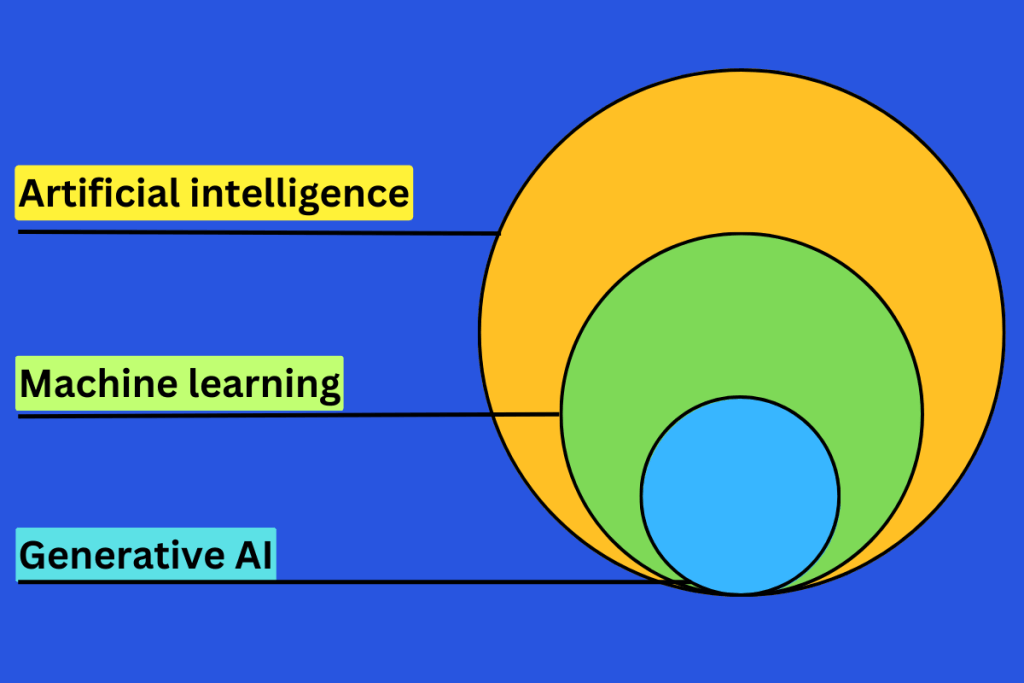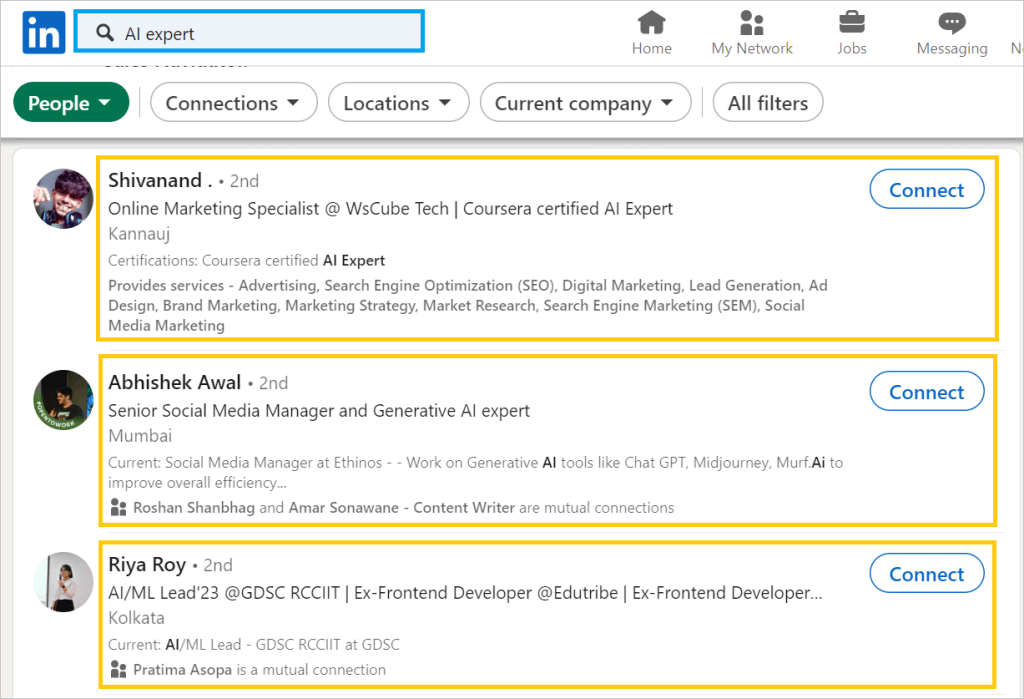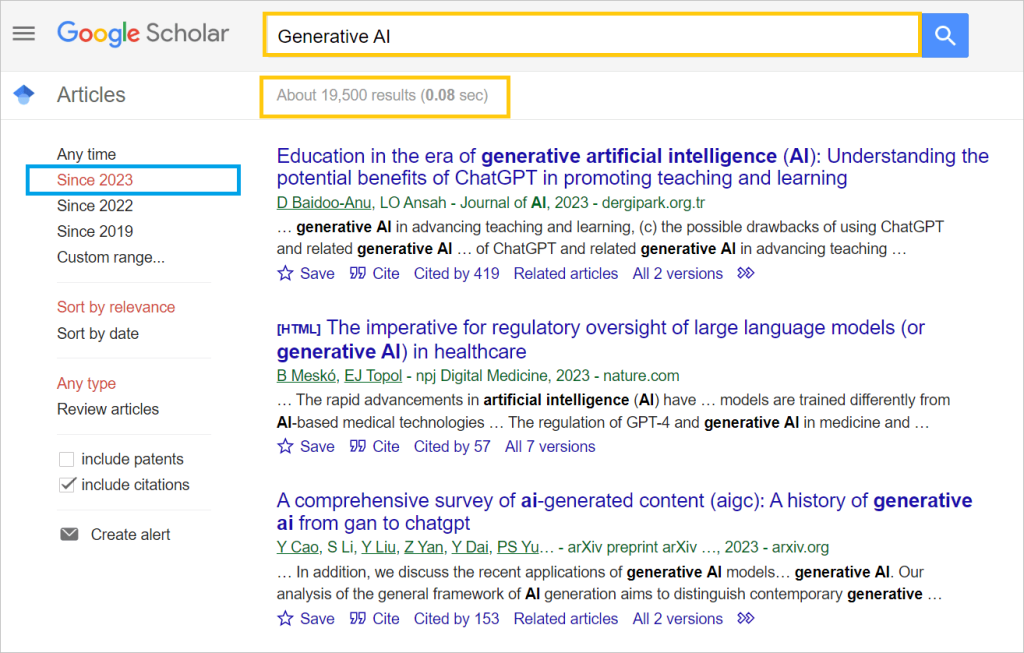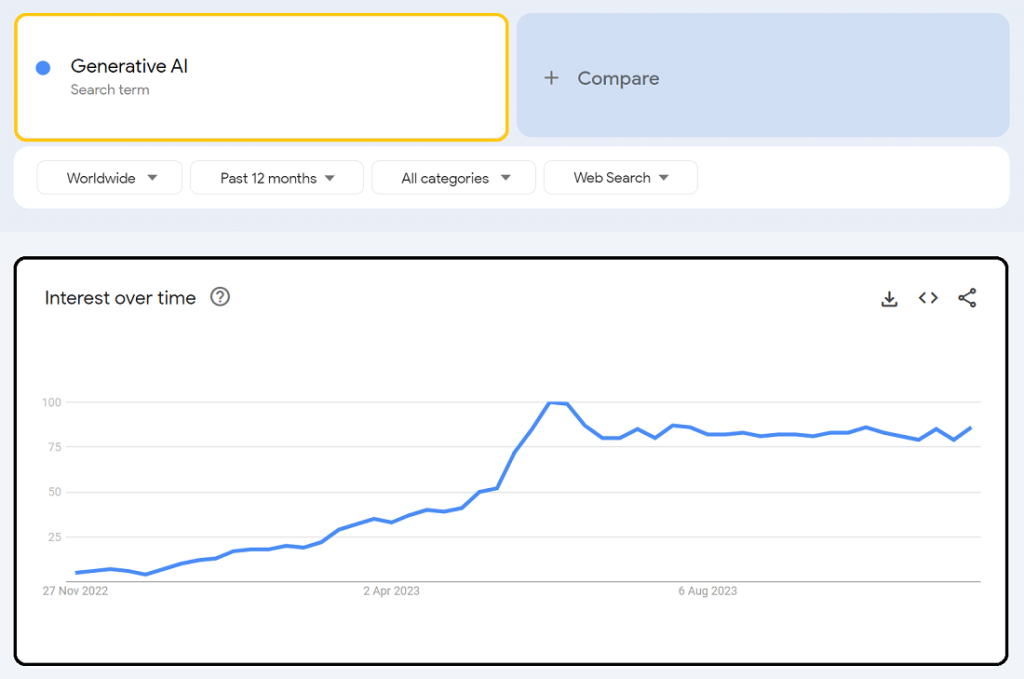⏱️ First Published: September 17, 2022 | Last Updated: November 25, 2023
We last updated this article on 25th November to replace 19 AI seminar topic ideas that are trending and more specific to the AI field. Also, we have included research references for each topic so you can study further.
If you’re a college student looking for final-year project ideas or struggling to find interesting artificial intelligence seminar topics, this listicle guide is for you.
As an AI developer, I understand the current trends and AI presentation topics that will stand out from your classmates.
After days of research through Google Scholar, asking ChatGPT, and exploring the latest AI projects, I have created this list of 21 AI seminar topics for 2024.
The best part?
You will also find free resources for each AI topic so you can do your further research.
Before diving into the topics, let’s cover the basics first.
What is Artificial Intelligence?
Artificial Intelligence is a technology of making a computer or software intelligent enough to think like a human brain. So that machines can do human tasks more effectively and find better solutions than human minds.
These machines are mainly used for repetitive and complex human tasks but they can also think, learn, and improve their work performance, just like human beings.
AI research and seminar topics for 2024
Let’s explore the latest artificial intelligence (AI) seminar topics of 2024:
1. Generative AI in virtual reality
Gen AI is a type of artificial intelligence that can create new content (image, video, text, audio) based on what it has learned from the existing content. Specifically used for creative tasks like making art, music, and writing.
All you need to do is feed it with data, and it uses its training to generate unique creative outputs.

However, the role of generative AI is not only limited to creating content. You can also use the technology in virtual reality and the metaverse. In this seminar, you can discuss the synergy between generative AI and VR, exploring the potential for transformative and personalized virtual experiences.
As team leaders navigate this evolving tech landscape, it’s essential to stay ahead by understanding how emerging technologies intersect with leadership roles.
Exploring ‘Essential Team Leader Interview Questions and Answers‘ can provide valuable insights for those looking to excel in leadership positions in a tech-driven world.
In this Gen AI seminar presentation, you can cover the following topics:
1. Generative Algorithms for VR Environments:
- Explore various generative algorithms:
- Procedural generation
- Machine learning-based scene generation
- Adaptive content creation
2. Real-Time Adaptation:
- Investigate how generative AI adapts VR environments:
- Based on user interactions, preferences, or external factors
- Enhancing user engagement and personalizing the VR experience
3. Immersive Storytelling:
- Examine the role of generative AI in crafting VR narratives:
- Dynamically generating story elements, characters, and plot developments
- Creating interactive and responsive storytelling experiences
4. User Experience and Interaction Design
- Delve into the impact of generative AI on VR user experience:
- Enhancing engagement, presence, and overall satisfaction
- Discussing its role in interaction design within VR applications
5. Challenges and Future Directions
- Address challenges in implementing generative AI in VR
- Computational constraints, user feedback, and ethical considerations
- Explore potential future developments in the VR and generative technology landscape
6. Gen AI use cases and applications:
- Showcase practical examples of generative AI in VR:
- Gaming, training simulations, architectural visualization, virtual tourism
Seminar references:
- Generative AI Models and Extended Reality (XR) Content for the Metaverse
- A curated list of modern Generative Artificial Intelligence projects and services
2. Transformers
Transformers are a type of neural network that work by using a self-attention mechanism and can generate human-like text.
They are trained on massive amounts of text and code, and can be used for tasks like text summarization and answering questions.
Transformers can learn long-range dependencies in text, which means they can understand relationships between words that are far apart in a sentence. This is important for many NLP tasks, such as machine translation, where the meaning of a word can depend on the whole sentence.
It is a must-attend seminar as it is still an active area of research and there are many opportunities to contribute to the field.
Project references:
3. Deep Learning in Healthcare
Deep learning comes from the family of machine learning but with the advancement of making predictions by learning the stored data and analyzing it. In recent years, deep learning has become one of the most popular topics in the field of artificial intelligence (AI).
The reason being the success of deep learning in many different applications,such as vision, natural language processing, and robotics.
Here’s a note from an AI developer who worked on this project:

If you’re interested in choosing the seminar topic ‘deep learning in healthcare, you will need to consider highlighting topics on CNN, transfer learning, and metrics precision. Different models of neural networks (such as ResNet, DenseNet, Xception, etc.) are fundamental to know. Also, you will need a clear idea of which model you will use for the research and study.
Pro tip: If you can show the implementation of different algorithms on your dataset and their results, it will be easy for others to understand which algorithm is suitable for which situation
When presenting something related to healthcare, it will be a little tricky because your approach needs to be noble, making it easy-to-detect diseases that will help doctors.
When your approach can compete with manual detection or a long-time process of tests, then only it will be considered a noble approach.
— Contributed by Shrabana Saha (AI software developer)
Project references: Identification of Coronavirus & Pneumonia from Chest x-ray Scans using Deep Multilayered CNN
4. Generative Adversarial Networks
GANs are a type of machine learning model that can be used to generate realistic data.
The model works by training two neural networks against each other: a generator and a discriminator.
The generator tries to create fake data, while the discriminator’s job is to tell real from fake, and by doing so they improve over time and generate very realistic and creative content.
GANs are an interesting topic for seminars as they can be used to generate realistic images and videos. Also, GANs are relatively new, which means there is still a lot of active research going on.
Project references: GAN applications and demonstrations
5. Graph Neural Networks (GNNs)
GNNs are a type of artificial intelligence technology that helps us understand and process data structured as graphs.
They are used to represent connections between things, like social networks or molecular structures to analyze and learn, making them useful for recommendation systems, identifying patterns, and solving complex problems.
To use GNNs, you’d start with a graph dataset, create a GNN model, and train it to make predictions or gain insights from the connections within the data.
Project references:
6. Reinforcement Learning
Reinforcement Learning is a type of machine learning where the model makes decisions and improves its performance through trial and error.
To execute RL, you set up a learning environment, and define actions and rewards, and the agent learns by taking actions and receiving feedback.
It’s like teaching a dog tricks; they learn by doing and getting treats when they do well, which makes it a powerful method for training AI systems.
Project references: Introduction to Reinforcement Learning with David Silver, DeepMind
7. Explainable AI
Explainable AI (XAI) is a way to make AI systems understandable to humans. It can help us to answer questions like “How does this AI system work?” and “Why did it make that decision?”
Therefore, it can help us to trust AI systems and make better decisions because we understand their predictions.
XAI is a quickly growing field with a wide range of potential applications. We will see even more innovative and impactful applications of XAI in the future.
Project references: From Artificial Intelligence to Explainable Artificial Intelligence in Industry 4.0: A Survey on What, How, and Where
8. AutoML
Automated Machine Learning is a technology that automates the process of building and optimizing machine learning models. It empowers non-experts to create effective AI solutions without in-depth knowledge.
To use AutoML, you typically select a dataset, choose the type of task you want to perform (e.g., classification or regression), and let the system automatically handle model selection, hyperparameter tuning, and optimization. This simplifies AI development, making it accessible to a broader audience, and can save a lot of time and effort in building machine learning models.
Project references:
- Bank Customer Churn Prediction using H2O (AutoML)
- How Tesla uses ai technologies to build autonomous cars
9. Artificial Neural Networks
Seminars on this topic tend to elaborate on the processing of data by computer programs that resemble the way human brains draw connections. This has been a huge savior for many sectors and companies by solving complex issues within shorter spans.
Hence, just as biological neurons form a big part of a science student’s curriculum, ANNs are major topics for AI enthusiasts.
Project references:
- Applied Deep Learning- ANN – the architecture and how they can be applied
- Autonomous Navigation Project on Artificial Neural Networks
10. Ensemble Techniques
Ensemble Techniques typically involve combining multiple models to improve the overall accuracy. It is like asking a team of experts to make a prediction, and then averaging out their answers.
You just create a team of models, such as decision trees or neural networks, and use techniques like bagging or boosting to combine their results.
The final prediction of the ensemble model would likely be more accurate than the prediction of any individual model.
This is because the ensemble model is able to leverage the strengths of each individual model, while mitigating their weaknesses.
Project references:
11. Recurrent Neural Networks
Recurrent Neural Networks (RNNs) are a type of artificial neural network that can process sequential data.
They work by processing data one step at a time. At each step, the RNN takes the current input and its previous state to produce a new output and a new state. The new state is then used to process the next input.
This process is repeated until the end of the input sequence. At the final point, the RNN’s output is the final prediction.
This allows RNNs to make predictions that are based on the entire input sequence, not just the current input.
Project references:
12. Recommender System
Have you wondered how your feed automatically aligns with your social media interests? Well, this is the recommender system. Learners often get curious about such day-to-day life topics and turn to seminars and workshops to get their queries answered.
In addition, recommender systems fall under the machine learning model and employ strategies to track user preferences.
Project references:
13. Natural Language Processing
Your Google Assistant or the Amazon Alexa form in this very category of natural language processing applications. These machines are programmed to mimic human speech or text and respond to it aptly.
Students attending seminars on this can better understand how these machines not only understand the text and speech but also reciprocate with meaning and advancement.
Project references: Medical Natural Language Processing Project
14. Transfer Learning
Transfer learning is a technique in which a pre-trained model (BERT, GPT-3, ResNet, etc) is used on a new task.
This is handy for people working on real-world machine learning projects who don’t have a lot of data or who find it difficult to train a model from scratch.
We take the already learned model and adjust it to fit the new task, which is easier than starting from scratch.
Visual representation of the model’s working : (timestamp 2:18 to 5:12)
Project references: Using Transfer Learning for Code-Related Tasks
15. Convolutional Neural Networks
Convolutional Neural Networks (CNNs) are a type of artificial neural network that is particularly well-suited for image recognition and classification tasks.
CNNs work by breaking down images into small pieces and then learning to identify patterns in those pieces.
It makes a very interesting topic for a seminar as it is one of the most successful types of machine learning models for image recognition and classification tasks and is relatively easy to understand and implement.
Project references:
- Real-Time classification of Plankton species using Convolutional Neural Networks
- Simple explanation of convolutional neural network | Deep Learning Tutorial 23 (Tensorflow & Python)
16. Computer Vision
Computer Vision is a unique field of artificial intelligence that deals with deriving information from visual inputs like images. Students can learn how these computers are trained to understand the image and derive from it a result in as little time as possible. The system operates with cameras and other data inputs to achieve accurate results.
You can also extend this seminar topic to pattern recognition— which is a closely related concept of computer vision and machine learning.
Pattern recognition is about identifying and classifying the data based on previous inputs to predict a pattern. Common examples may include speech recognition and speaker identification, commonly discussed in seminars.
Pattern recognition project idea: Work on developing an AI system that can recognize and diagnose plant diseases based on images of plant leaves. For this you will need to collect a diverse dataset of images featuring healthy plants and various diseased conditions. Include common plant diseases like rust, powdery mildew, and blight.
This way, you can train the machine to identify the pattern in images of leaves.
Project references:
- Real-Time Computer Vision Project with OpenCV
- Using Deep Learning for Image-Based Plant Disease Detection
- Pattern recognition and image analysis
17. Autoencoders
Autoencoders are a type of neural network used in artificial intelligence that can take complex data, like images or text, and simplify it into a compact code.
Then, they can unscramble this code to reconstruct the original data and hence the name.
Autoencoders are used in various applications, like image denoising, compression, and even recommendation systems, where they help find things you might like based on your past preferences and this is why many learners are propelled to this topic after getting enough information.
Project references:
18. You Only Look Once
You Only Look Once (YOLO) is a real-time object detection algorithm that has gained popularity in recent years.
It is a single-stage algorithm which means that it can detect objects in a single pass of the image.
This makes it very fast and efficient, making it ideal for real-time applications such as video surveillance and self-driving cars.
It makes an interesting topic for a seminar because it is a state-of-the-art object detection algorithm that is used in a wide variety of applications and also a relatively easy algorithm to understand, making it a good choice for students.
Project references:
19. Semi-Supervised Learning
Semi-supervised learning (SSL) is a type of machine learning that uses a small amount of labeled data and a large amount of unlabeled data to train a model.
It is an interesting topic for a seminar because it allows us to train models on large datasets without having to label all of the data, which can be very time-consuming and expensive.
Seminars conducted on this topic are precisely made to teach the extensive working of this relatively new field.
Project references: Semi-supervised learning: A brief review
20. AI-Powered Chatbots for Social Good
AI-powered chatbots are computer programs that can talk like humans.
Used as a substitute for professional help as the bots can talk, offer emotional support, and suggest coping strategies.
Attending such a seminar can help in building a good professional network and learn about responsible AI development and deployment.
Project references: Chatbot for mental health
21. Robotic Process Automation
Robotic Process Automation (RPA) is a technology that allows businesses to automate repetitive and rule-based tasks.
RPA bots can mimic human actions to perform tasks such as data entry, order processing, and customer service.
In seminars dealing with this, students understand how RPA is shaping the future of work and its potential when integrated with AI to transform the way businesses operate.
RPA project idea: Intelligent Document Processing (IDP) with RPA
In this project you can develop an RPA project that integrates IDP to automate the extraction and processing of information from unstructured documents. The goal of this project will be to streamline document-intensive processes in various industries— which results in enhancing efficiency and reducing manual labor.
Project references:
FURTHER RESOURCES ON AI CAREER:
- Artificial Intelligence Documentaries
- How Can DevOps Teams Take Advantage of AI?
- Will AI replace software engineers?
How do I ensure my AI seminar topic is current and relevant?
Step 1: Stay connected with AI experts
Follow AI influencers and related hashtags on platforms like Twitter or LinkedIn for the latest news.
Some notable influencers on Twitter include Yann Lecun, Yoshua Benjio, Geoffrey Hinton (who invented backpropagation), and Andrew Ng.
You can also use LinkedIn to find AI developers and professionals from a specific country or region.

Step 2: Read recent research and findings
Google your keyword on the ‘Google Scholar’ section to find the latest academic research and related publications.
Check Google News for trending articles and industry updates.
For instance, Here’s a screenshot of search results for ‘genai’. Top publications like Springer and arxiv show credibility and high-quality research.

Step 3: Type your keyword in Google Trends and see the search demand.
The below graph shows the search demand for the keyword ‘Generative AI.’

This will help you understand the demand of certain topics in the artificial intelligence domain. Also, you can find trending topics from Google Trends data.
Step 4: Find the industry demands
Review job postings on LinkedIn to see what skills or knowledge the tech industry is currently seeking in AI.

Carefully, read the job description and find the most common tools, technologies, and skills required in the AI field.
What tips do you have for presenting a successful AI seminar?
To give a great seminar, make sure the information is easy for everyone to understand, regardless of prior AI knowledge. Use visuals such as diagrams, charts, and graphs for better understanding. Ask questions and encourage people to join in. Finally, give a list of resources where they can learn more about AI.
What are some interesting final-year AI presentation topics for engineering students?
Based on my research through journals and research papers, I found the following AI presentation topics suitable for final year college students:
- Implementing neural networks for a specific application (e.g. image classification, speech recognition)
- Comparing different deep learning architectures
- AI for self-driving cars
- AI for robotics and controls
- Smart home automation with AI
- AI for predictive maintenance in manufacturing
- AI for financial forecasting and modeling
- AI security issues: threats and defenses
- AI in the cloud: opportunities and challenges
What are some good AI seminar topics for CSE final-year students?
If you’re a computer science engineering student you should pick seminar or presentation topics that are based on AI, data science, algorithms, and your technical skills (programming, project experience, etc.).
Below, I have shared 11 AI topics where you can showcase your technical core skills.
- Implementing chatbots using deep learning: focus on natural language processing and neural network architectures for developing conversational AI.
- Computer vision for facial recognition: explore techniques like CNNs and face detection frameworks like OpenCV.
- AI for self-driving cars: discuss sensor fusion, path planning, and decision making algorithms for autonomous vehicles.
- Text summarization and generation: use seq2seq models and attention for abstractive text summarization.
- AI for logistics and supply chain optimization: apply AI to optimize costs and routes in supply chains.
- Generative adversarial networks: implement GAN models for generating synthetic images, videos, and data.
- Reinforcement learning for games: train AI agents to play games like chess, go, and Atari using RL algorithms.
- Game theory: AI agents for games like chess, go, DOTA using min-max algorithms, alpha-beta pruning and heuristic search.
- Machine translation with neural networks: build an English-to-French neural machine translation model.
- Predictive maintenance with AI: use machine learning to predict equipment failures and guide maintenance.
- AI for fraud detection: apply anomaly detection and classification algorithms to detect bank fraud.
Learn about: CSE seminar topics
Final Words
If you’re serious about becoming an AI engineer, you should learn the fundamentals of artificial intelligence, AI career paths, branches, and current trends. Once you cover the basics, you can prepare your AI seminar presentation on any technical topics with ease.
Have any AI presentation topic ideas? Feel free to message me.

Tata Sai Nandini is an IT Professional with experience in the Python and Data Science domain. With expertise in Statistical Analysis, Exploratory Data Analysis, Data Visualization, Data Extraction, Data Wrangling, Image Processing, Text Processing, and the creation of Machine Learning and Deep Learning models, she is a versatile and skilled practitioner in the field. Tata Sai Nandini’s skillset encompasses a wide range of tools and technologies, including Python, C++, C, various IDEs, Python libraries, data visualization tools, and machine learning and deep learning frameworks.


